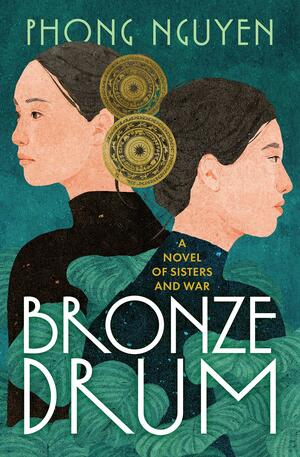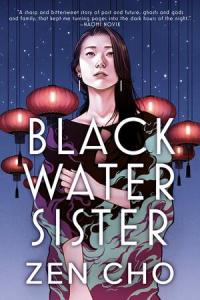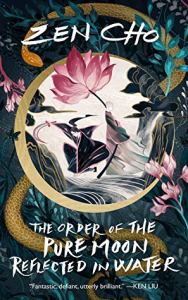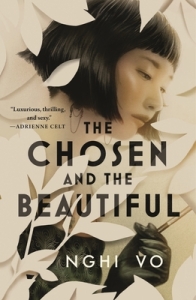Title: Bronze Drum: A Novel of Sisters and War
Author: Phong Nguyen
Genre: Historical Fiction
Trigger Warnings: Death, blood (mentions), confinement, injury, sexual content (not described), colonialism, suicide attempt
Note: Trigger warnings in DNF books only cover the part I read. There may be triggers further in the book that I did not encounter.
Read To: Page 184
Back Cover:
Gather around, children of Chu Dien, and be brave. For even to listen to the story of the Trung Sisters is, in these troubled times, a dangerous act.
In 40 CE, in the Au Lac region of ancient Vietnam, two daughters of a Vietnamese Lord fill their days training, studying, and trying to stay true to Vietnamese traditions. While Trung Trac is disciplined and wise, always excelling in her duty, Trung Nhi is fierce and free spirited, more concerned with spending time in the gardens and with lovers.
But these sister’s lives—and the lives of their people—are shadowed by the oppressive rule of the Han Chinese. They are forced to adopt Confucian teachings, secure marriages, and pay ever‑increasing taxes. As the peoples’ frustration boils over, the country comes ever closer to the edge of war.
When Trung Trac and Trung Nhi’s father is executed, their world comes crashing down around them. With no men to save them against the Han’s encroaching regime, they must rise and unite the women of Vietnam into an army. Solidifying their status as champions of women and Vietnam, they usher in a period of freedom and independence for their people.
Vivid, lyrical, and filled with adventure, Bronze Drum is a true story of standing up for one’s people, culture, and country that has been passed down through generations of Vietnamese families through oral tradition. Phong Nguyen’s breathtaking novel takes these real women out of legends and celebrates their loves, losses, and resilience in this inspirational story of women’s strength and power even in the face of the greatest obstacles.
Review:
I struggled with this book from the very beginning. And normally when that happens, I decide to stop fairly early on. It’s part of my whole “only read books that I enjoy” goal – if I’m not enjoying it, why keep reading?
The problem here is that I really wanted to like this book. It’s such a fantastic concept. I had never heard the story of Trung Trac and Trung Nhi before, but a pair of sisters who raise an army of women to drive out the people occupying their country is such a fantastic story. Even better, this is based on real historical people and events! My knowledge of Vietnam is extremely limited, so I was excited to learn more about Vietnamese traditions and values. And not only is Vietnam an awesome setting, this is specifically Bronze Age Vietnam, which, as someone who finds ancient history much more interesting than anything that happened less than a thousand years ago, I found especially appealing. There are so many good ideas and good concepts and things I really, really wanted to love and immerse myself in.
However, it ultimately ended up being disappointing. Some of that was stylistic. The writing was very a folktale, oral tradition type of style – narrative heavy, switching perspectives with no warning, not identifying particular “main characters,” and telling you everything that goes on instead of actually showing you. Though there wasn’t an explicit narrator, there was a strong sense of the story, the setting, and anything that might have made it feel vibrant being mediated and muted through the lens of an omnicient storyteller. The characters and world, though interesting in concept, struggled to rise off the page.
This isn’t necessarily a bad thing. Sometimes this storyteller-narrator style could work – and it’s not an inherently bad choice for a story based in oral tradition like this is. It wouldn’t be easy to make it work in a 400-page novel, but it’s possible. In fact, I think it could have worked if it weren’t for this book’s second major problem: Nothing happens.
The back cover establishes that the death of Trung Trac and Trung Nhi’s father is when the story actually gets started. When I stopped reading, he was still alive. Nothing truly interesting happened until 150 pages into the book. The first 184 pages (and possibly more) were more like a slice of life in that time period. Trung Trac and Trung Nhi walked in the gardens, practiced fighting forms, learned from their tutors, fell in love, argued with each other, made occasional stupid decisions, had complex relationships with their parents, and generally just lived as Vietnamese young women under the Han invaders. Again, in itself, this isn’t necessarily a bad thing. If done right, having such a long period of “setting the scene” can make the rest of the story feel more important and impactful.
The problem is that this book tries to do both. With the storyteller style, the reader isn’t getting a lot of emotional connection with the characters, so it needs to have a stronger, quicker-paced plot to make it work. To keep a long period of setup from getting boring, the reader needs to create strong emotional connections with the characters. But by doing both, the narrator/storyteller style toned down the emotions and kept me from forming a connection with any of these characters that would have engaged me in the minutiae of daily life, and having such a long period of setup left me with no plot or major central conflict to get invested in.
This is a really difficult book to review because I desperately wanted to like it. I really wanted to read this story about warrior sisters in Bronze Age Vietnam! But the telling made two choices that both individually make sense (storyteller style to emphasize its oral origins and long setup to familiarize Western readers with the place and time) that combined to make it dull. Not unreadable, definitely, but not really enjoyable either. I wanted so much to like this. I just didn’t.




